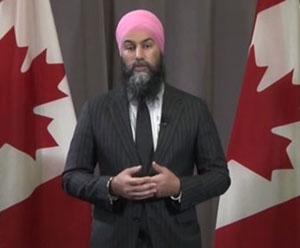Wednesday May 26, 2021 | NATIONAL [Updated May 28, 2021]
by Mary P Brooke, Editor | Island Social Trends
The federal government is planning to cut back on the Canada Recovery Benefit (CRB) by $800 a month in July and August, and the federal NDP are trying to stop that from happening.
In last month’s federal budget, the Liberal government announced that CRB payments of $2,000 per month (actually issued as $1,800 per month — or more specifically as $900 every two weeks — which includes a tax prepayment) would be cut to $1,200 come July.
Dangers of cutting back CRB too soon:
Today NDP Leader Jagmeet Singh said that until various sectors are fully open, some people will fall between the cracks if CRB payments are cut back but work is not yet fully available to the two million people who presently rely on the benefit that supports people who are unable to otherwise receive supports through the EI (Employment Insurance) program, including self-employed individuals.
“Trudeau is cutting help to families who are barely making ends meet,” said Singh. “Throughout this pandemic, the Liberals wanted to look like they cared, but they left people behind,” he says.
Fighting to maintain CRB:
The NDP under Singh’s leadership was able to maintain increase the previous Canada Emergency Response Benefit (CERB) using political pressure in the House of Commons. He plans to do the same to keep CRB from being reduced. “It’s another fight,” he told Island Social Trends today during his live media conference from Ottawa. “We will use the powers that we have to stop them.” The approach will be to use “amendments to the BIA so that this change is not adopted”.
When asked if BC is perhaps opening up too fast now while the pandemic still continues, Singh said he sees BC as committed to following the evidence. “We should all be informed about the best way to open up. What we can do at federal level. is to make sure that a paid sick leave program is in place.,” he said, noting that COVID spread is coming from workplaces. To help people, they need to be able to stay home when sick.
Singh said today in his teleconference from Ottawa that he could see rolling back the CRB benefits as provinces are re-opening, specifically, “when everyone is vaccinated and sectors open up again”. But that to pin the reduction of CRB from $900 per pay period (i.e. $1,000 per two-week period, less $100 tax holdback) or from $1,800 per month down to $1,000 per month is making for a precarious transitional period for some workers. Some workers may in fact not end up returning to the sector of their previous work at all, if they ‘miss the boat’ so to speak because their personal finances would have stumbled during the transition.
The BC COVID restart:
Singh is the MP for the Burnaby South riding in the BC lower mainland. Island Social Trends and Global National both asked Singh today about the approach to reopening the economy in BC, as was given a high-profile announcement yesterday by Premier John Horgan where BC seems to be going rather quickly from a circuit-breaker to a rapid reopening that has immediate indoor dining and only two-week phases from in June to include travel and by September also concerts and sports stadium attendance.
Singh replied that he is sees BC is “committed to following evidence” and that Premier Horgan “has shown great leadership in the pandemic”. Singh stands by “following the advice of the experts” as BC opens up. “I’ve seen BC continue to follow the evidence,” he said, within the context of BC perhaps doing better than most provinces during the 15 months of the COVID pandemic to date.
Bank fees:
Today Singh also said that it’s unconscionable for the federal government to be allowing the big banks to increase user fees during pandemic economic recovery and that the finance minister should be telling the banks to not be doing that.
Raising fees for most customers will be an additional financial burden at a time when there is a lot of pressure for financial recovery for most individuals, families and small businesses.



